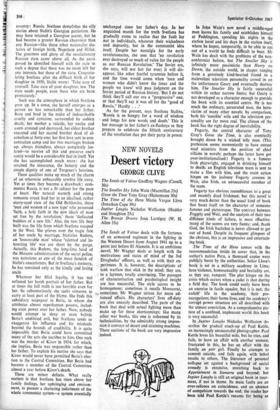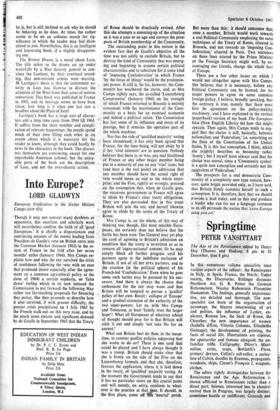NEW NOVELS
Desert victory
GEORGE CLIVE
The Smaller Sky John Wain (Macmillan 21s) Gone the Time Tony Gray (Heinemann 30s) The Time of the Hero Mario Vargas Llosa (Jonathan Cape 30s) Jupiter Laughs Nicholas Wollaston (Hodder and Stoughton 25s) The Bronze Drums Jean Lart6guy (W. H. Allen 33s) The Sands of Valour deals with the fortunes of an armoured regiment in the fighting in the Western Desert from August 1941 up to a point just before El Alamein. It is an ambitious novel; Mr Wagner deals at length with the motivations and states of mind of the 3rd Droghedas' officers, as well as with their ex- periences. It is, however, the descriptions of tank warfare that stick in the mind; they are, to a layman, totally convincing. The passages of characterisation and psychological insight are less successful. The style ceases to be homogenous; sometimes it recalls Monsarrat, sometimes Mr Wagner strives for more ad- vanced effects. His characters' lives off-duty are also uneasily described. The parts of the book that deal with actual fighting more than make up for these shortcomings; like many other war books, this one is redeemed by its technicalities, by the admirably strong impres- sion it conveys of desert and straining machines. These sections of the book are very impressive indeed. In John Wain's new novel a middle-aged man leaves his family and establishes himself at Paddington, spending his nights in the station hotel and his days in the station itself, where he hopes, temporarily, to be able to opt out of a world he finds difficult to bear. Mr Wain has dealt with the problems of the non- conformist before, but The Smaller Sky is infinitely more pessimistic than Hurry on Down; the outside world, in shapes ranging from a genuinely kind-hearted friend to a malevolent television personality crowd in on the unfortunate Geary and eventually destroy him. The Smaller Sky is fairly successful within its rather narrow limits; but Geary is not developed as a character enough to provide the book with its essential centre. He is too much the ordinary, persecuted man, the hero- victim of many other novels; by comparison, both his 'sensible' wife and the television per- sonality are far more real. The climax of the book has the right degree of inevitability.
Fogarty, the central character of Tony Gray's Gone the Time, is also eventually brought down by a wicked telly man. (This profession seems momentarily to have ousted mad scientists from the position of chief villains in novels; perhaps the latter have got over-institutionalised.) Fogarty is a famous Irish playwright, engaged in drinking himself to death; an English television team is sent to make a film with him, and the main action hinges on the jealousy Fogarty arouses in Weir, also Irish, an unsuccessful member of the team.
Fogarty has obvious resemblances to a great and recently dead Irishman; but this novel is very much better than the usual kind of book that bases itself on the character of someone famous and picturesque. The contrast between Fogarty and Weir, and the analysis of their two different kinds of failure, is most effective; many of the scenes are very funny; and, thank God, the Irish backchat is never allowed to get out of hand. Despite its frequent glimpses of the obvious, this is an impressive and entertain- ing book.
The Time of the Hero comes with the recommendation inside its cover that, in the author's native Peru, a thousand copies were publicly burnt by the authorities. Senor Llosa's book is set in a military academy in Lima; here violence, homosexuality and bestiality are, as they say, rampant. The plot hinges on the crisis which occurs when a cadet is shot during a field day. The book could easily have been an exercise in facile squalor, but it is not; the cadets' life in the academy, their pre- occupations, their home lives, and the academy's corrupt power structure are all described with the utmost conviction. As a comprehensive pic- ture of a confined, unpleasant world this book is very successful.
In Jupiter Laughs Nicholas Wollaston de- scribes the gradual crack-up of Paul Kettle, an increasingly unsuccessful photographer. Paul Kettle loves his beautiful wife, but he tries, and fails, to have an affair with another woman; frustrated in this, he has an affair with the family au pair girl. Finally he attempts to commit suicide, and fails again, with lethal results to others. The literature of personal collapse set against a background of social comedy is extensive, stretching back to Appointment in Samarra and beyond; but Jupiter Laughs is still an original book in treat- ment, if not in theme. Its main faults are an over-reliance on coincidence, and an absence of compulsion towards the end; the reader has been told Paul Kettle's reasons for being as
he is, but is still inclined to ask why he should be behaving as he does. At times the author seems to be on an arduous search for sig- nificance in which the reader may feel disin- clined to join. Nevertheless, this is an intelligent and interesting book, if a slightly disappoint- ing one.
The Bronze Drums is a novel about Laos. The title refers to the drums set up under waterfalls by a Han dynasty general to con- vince the Laotians, by their continual sound- ing, that non-existent armies were massing. M Lartdguy's thesis is that the communist ac- tivity in Laos was likewise to distract the attention of the West from their areas of serious subversion. This book was published in France in 1965, and its message seems to have been taken; how long is it since one last saw a headline about the Plain of Jars?
Larteguy's book has a large cast of charac- ters and a long time, span, from 1944 till 1964. It suffers from the sheer number and compli- cation of relevant happenings; the people spend much of their time filling each other in on events about which it is necessary for the reader to know, although they could hardly be news to the characters in the book. The charac- ters themselves are convincing, except for one improbable American colonel; but the enjoy- able parts of the book are the descriptions of Laos, and not the over-chaotic action.



































 Previous page
Previous page